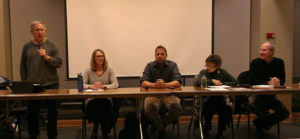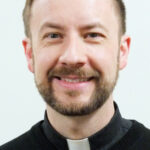By Barb Arland-Fye
The Catholic Messenger
DAVENPORT — During a panel discussion on environmental justice, Father Bud Grant observed that those who benefit most from using the earth’s resources ought to make sacrifices on behalf of those who benefit the least. He called for shifting suffering from the poor and marginalized to the people with more than enough to meet their needs. It’s the right thing to do — for all living things on earth today and for future generations.

Father Bud Grant, standing, participates in a panel on environmental justice at St. Ambrose University in Davenport. To the right are panelists Amy Blair, Brian Ritter, Steve Drucker and Alex Cicelsky.
• Fr. Grant, a professor of moral theology at St. Ambrose University in Davenport, was one of five panelists at the Nov. 18 discussion on campus titled “Visions of Environmental Justice at Home and Abroad.”
• Panelist Amy Blair, associate professor of biology at St. Ambrose, said students in her class learn about their Ecological Footprint. “It’s the idea that you can put a number on how much land and water are needed to sustain a person based on his/her lifestyle.” The ideal number is 1.7 hectares (about 2-1/2 acres). The average Ecological Footprint, however, is around 10 hectares, she said. Blair encouraged the audience to calculate their own Ecological Footprints (for starters, visit the website www.earthday.org/footprintfaq ). For her students, Blair said, “This sets off a journey … What can we do to start reducing our large feet? Think about how we can use the earth’s resources more fairly.”
• Panelist Brian Ritter, executive director of Nahant Marsh in Davenport, told the audience that just 1/10th of 1 percent of Iowa’s prairie remains. His greatest concern is that today’s youths don’t get enough exposure to nature the way he did growing up. “If people don’t know nature, they’ll fear it or become indifferent to it. We’re doing a great injustice to our youth by not exposing them to nature.”
• Alex Cicelsky, a panelist and visiting scholar with St. Ambrose University’s Middle East Institute, described his journey into the environmental movement. Thirty years ago, he left his studies at Cornell University in Ithaca, New York, to explore the techniques of growing food in Israel’s desert.
Cicelsky is a founding member of Kibbutz Lotan and the collective’s Center for Creative Ecology. Kibbutz Lotan researches, develops and teaches hands-on sustainable engineering in nature conservation, agriculture, energy efficient and low-carbon housing, waste and water treatment and renewable energy.
“I got in some trouble in your cafeteria,” he told the audience. He’d written a note in the suggestion box asking what could be done about the wasted food he was seeing on a conveyer belt, destined for the garbage. He thinks such waste is disrespectful to the farmers who grow the food and the people who prepare it. Students, he was told, respond with “Who cares? I bought the food.”
The issue is an ethical one, Cicelsky said. He thinks people ought to take an approach toward the environment that is intentional and immediate. He described how in Israel “we’re working to reduce waste, but also to grow food in the desert.” He spoke of an eco-village being created in a Palestinian village, a place of hope in a region where there’s so much despair … It takes a village and a community to make a difference,” Cicelsky observed.
•Steve Drucker, an addictions recovery counselor involved in The Climate Mobilization, was the fifth panelist. She told the audience that planet Earth is suffering because of people’s addictions to power and money, among other things. She urged audience members to visit the website www.theclimatemobilization.org to get a better understanding that “Earth is our home and it’s a living home. It doesn’t need us getting into its veins.”
Another questioner asked the panelists why more people aren’t talking about global warming. Cicelsky responded: “We don’t feel its impact. … Economically, there’s no incentive for us to do anything different.”
“What can we do at the local level?” another audience member asked. Follow Pope Francis’ advice, responded Fr. Grant. “He said we need to consume less.” The priest theologian admitted the issue of climate change has become politicized. Some oppose government intrusion, but alleviating the consequences of climate change requires international cooperation because the world is interconnected.
Cicelsky observed that “We can change our ways.” Germany, for example, has an Ecological Footprint half the size the U.S., and a higher standard of living. “Their houses are a lot smaller … they can’t build a house that’ not energy efficient.”
Fr. Grant said he’s optimistic about the upcoming Global Climate Summit in Paris. He noted that the summit is allowing individual countries to determine their own actions in improving the health of the planet. He sees that as an encouraging start.












I applaud the many actions that members of the Quad Cities communities are taking in nature conservation and restoration, education and action to care for the environment. My ‘aha moment’ from the panel discussion is the social challenge: many issues pertaining to environmental quality, energy and pollution have become partisan in the USA. We’re working in the Middle East to de-politicize the discussions on these issues so that cross cultural and transnational actions can be implemented for the benefit of our citizens and future generations. “The environment knows no boundaries”. I look forward to continued connections between our communities. Alex Cicelsky http://www.KibbutzLotan.com